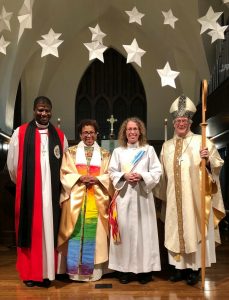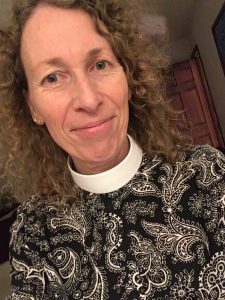
Nicola Bowler, professor of materials science and engineering (MSE) at Iowa State University, has an interesting backstory.
She is a female faculty member in engineering, a field which has historically been represented by men and still sees males play the majority role (nationally, on average, only 16.9 percent of tenure/tenure-track faculty in U.S. colleges of engineering are women).
She also moved to the United States from England in 1990. But perhaps most interesting of all: Bowler recently became an ordained deacon in the Episcopal Church.
Specifically, Bowler serves at St. John’s by the Campus Episcopal Church in Ames, located on Lincoln Way across from Iowa State’s Lake Laverne. She has been a member there since the year 2000.
“In the Episcopal Church, a deacon promises several things at their ordination. At the core of those promises is the following: To ‘look for Christ in all others, being ready to help and serve those in need’ and to ‘interpret to the Church the needs, concerns and hopes of the world,’” Bowler said. “In practice this means, in my case, assisting with pastoral visiting to those who are ill or unable to attend church services, and promoting awareness around issues of social justice, including LGBTQ+ equality, care for our environment, care for those experiencing homelessness and advocating for compassion in public policy.”
 Themes of social justice are important to Bowler, both as a deacon as well as a professor.
Themes of social justice are important to Bowler, both as a deacon as well as a professor.
“I have noticed that the works of university service that I perform have become more aligned with my role as a deacon, such as contributing to conversations concerning inclusivity on campus, which has become even more important in recent years,” she said.
Bowler has believed in the importance of inclusivity since her own childhood. She grew up attending a small United Reformed Church in England, and she was enrolled in a Roman Catholic school. She remembers the feeling of being left alone in a church pew during communion at a Catholic mass, as she herself was not a Catholic and could not take communion there.
Later in her life, while attending an Episcopal church service, Bowler had a different experience. She remembers receiving holy communion from a female priest for the first time, and how that moment had a powerful effect on her sense of call to ordained ministry. She also finds it inspiring that the Episcopal Church has been open to ordaining women since the 1970s and has a reputation for inclusion and promoting participation of all types of people.
Bowler credits two people as inspirational on her journey to become deacon.
“The first is a St. John’s parish priest of 26 years, the late Reverend Al Aiton, whose sheer faithfulness, dedication and consistently inclusive preaching and teaching did its work on me over the 18 years that we attended St. John’s – like flowing water gradually smoothing a rock,” she said. “Secondly, the rector of St. Timothy’s Episcopal Church in West Des Moines where I completed my field education, the Reverend Mary Cole-Duvall, modeled for me the kind of priest that I hope to become. Seeing a role model that you can relate to is incredibly important when embarking on a new life direction.”
Role models are also important in education and engineering, Bowler believes. As a minority in her field, she has been the only woman at a conference, and she has taught classes of all men. But she says enjoying the field of study is not enough – young women need to see role models so they can recognize themselves in them.
“I didn’t appreciate that when I was younger,” Bowler said. “I knew I was good at math and physics, but as I get older I appreciate much more the importance of seeing role models like me. My first physics teacher was female – and a nun, in fact! When I took my physics Ph.D., the field at that level was 10 percent women.”
Bowler became an MSE associate professor in 2006, and inclusion at Iowa State was important to her in her decision to join the faculty.
“I may not have taken this job in 2006 if I didn’t think ISU was making a genuine effort to be welcoming and to make it possible for me to have a family and be on the tenure track,” she said. “The MSE department was on board with making it possible for different types of people to do this job that has historically been so male dominated.”
Since starting her seminary studies, Bowler has changed the way she approaches teaching. Being a student herself gives her a better idea of how to see learning from the student’s point of view in American education. She feels that she now has a better quality of relationship with students and, because she is tenured, she has more time available to work on being as helpful as possible.
“I can now be a voice for inclusion and respect in education,” she said.
From here, Bowler will continue in the ordination process, as she will be ordained as a priest later in 2019. She will keep proclaiming the gospel readings and continue to preach, which she does with the help of her family.
“My middle daughter is great at coming up with novel slants when I am working on preparing a sermon, and I find it very encouraging to have the support of family in the pews, on occasions when I am preaching,” she said.
And Bowler will continue to set the table for the celebration of Eucharist at St. John’s by the Campus, ensuring all are welcome, both at her church and in her classroom.
“One builds up over time a sense of being included,” she said. “When you find a place where you feel a sense of true invitation, it’s very powerful.”